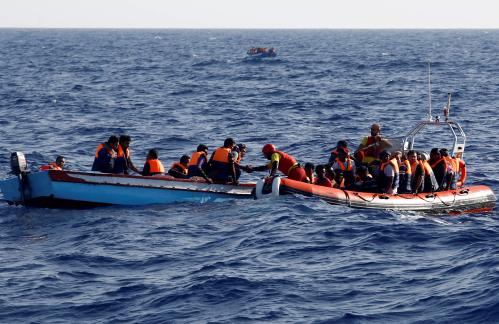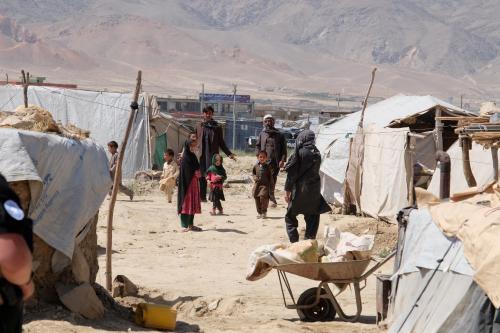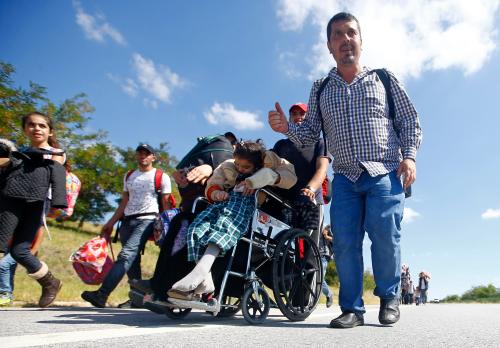Recent images of slave markets in Libya hit a deep, visceral vein. African slaves in North African markets being sold by non-Africans who are often complicit with African traffickers. This evokes memories most of us assumed we could consign to history. The scenes, occurring in at least nine “markets” in the country, are an affront to humanity and demand immediate action. Yet, the response so far has been underwhelming.
The U.N. Security Council held an emergency session to discuss sanctions against individuals and entities, and the use of the International Criminal Court, but the session ended without resolution (though it strongly condemned the practice). Furthermore, while the flurry of images in November 2017 elicited much hand wringing, the modern trade in humans had been going on for some time.
Amnesty International documented cases from 2015; and reports of vile treatment go back to at least 2010. According the International Organization (IOM), “slave market conditions” and detention are increasingly common as criminal gangs cash in. A December 2017 Time.com piece on Libya’s slave trade, which details the phenomenon, includes video footage and cites a subsequent investigation by CNN.
Othman Belbeisi, the IOM’s Chief of Mission in Libya, told reporters in Geneva, “Selling human beings is becoming a trend among smugglers as the smuggling networks in Libya are becoming stronger… Migrants are being sold in markets as a commodity.”
Modern Slavery and Development
An estimated 29.8 million people worldwide are living as slaves. In this instance, slaves are those forced to work without pay under the threat of violence and are unable to walk away. The International Labor Organization adds forced marriages to this, which brings the grand total to over 40 million people. Based on this larger estimate, the ILO estimates that revenues from this industry amount to $150 billion.
In a 2009 World Bank study, “Human Trafficking, Modern Day Slavery, and Economic Exploitation,” the term exploitation is the overarching theme under which human trafficking, slavery, forced labor, bonded labor, child labor, forced prostitution, and economic exploitation fall. Exploitation can be nonconsensual and consensual. Nonconsensual exploitation involves coercion, fraud, or deception, whereas consensual exploitation typically results from a lack of economic opportunities. Development agencies are working to counter consensual exploitation by implementing legal standards and labor and social legislation.
Because nonconsensual exploitation is dealt with through the criminal justice system, some question whether it is appropriate for development agencies to be involved in tackling it. Yet thinking along the development-security nexus is evolving and the development community is focusing increasingly on security sector reforms. On criminal justice, since the early 1990s, the World Bank has supported numerous justice-related activities. These include more than 30 major projects, valued at over $850 million, dedicated specifically to assisting in establishing efficient and effective justice systems.
In addition, Sustainable Development Goal 8—promoting inclusive and sustainable economic growth, employment and decent work for all—includes sub-target 8.7, which is to “Take immediate and effective measures to eradicate forced labor, end modern slavery and human trafficking and secure the prohibition and elimination of the worst forms of child labor, including recruitment and use of child soldiers, and by 2025 end child labor in all its forms.”
What can development actors do?
The following, adapted from a 2009 World Bank Social Development Note, Human Trafficking: A Brief Overview are suggested actions for development actors but have broader applicability:
(a) Monitoring and improving analysis to systematically investigate and document human trafficking for better monitoring and targeting support to vulnerable groups;
(b) Advocacy during policy dialogue for prevention with governments and in poverty reduction, gender, and recovery and reconstruction strategies;
(c) Integrating anti-human trafficking components into programs focusing on employment, education, health, labor, gender, youth, and migration; and
(d) Strengthening and putting an anti-trafficking lens on regional work, particularly on migration, trade, and transport.
What can be done in Libya?
In Libya, forceful advocacy undertaken consistently and with vigor by development agencies (including by their leadership) is an indispensable part of the equation. Aside from strong messaging, advocacy and leadership, partnership with the European Union is critical. While the closing of the Mediterranean route to the EU has worsened the situation in some respects, it has also opened possibilities of further aid to originating countries and Libya. Development actors can help work to improve conditions in originating countries as well as, for example, supporting Libya’s judicial system and strengthening institutions and legislation. Innovation and pushing the boundaries (as the World Bank did in Peru in supporting prison reforms) has to be ingrained.
The IOM is a key partner in this area. They are present on the ground, understand the situation better than most, and play an active role, including by repatriating stranded migrants, many of them victims of slavery. IOM staff can access certain government-run migrant detention centers and are trying to improve conditions when feasible. However, they are not present in centers controlled by traffickers where much of the abuse and slave trading takes place. The U.N. Human Rights Council has also asked for additional funds to combat slavery. Médecins Sans Frontières, which also has access to government detention centers, provides health care to migrants and refugees. Just as the World Bank has worked with U.N. agencies in Yemen during the conflict to deliver aid, a close partnership with the IOM and others involved in such efforts could yield tangible results.
Most importantly, Libyans are horrified by these crimes occurring in their country and are taking action in very difficult conditions. But they need help. There would be many willing counterparts across the political spectrum who want to get rid of this blight on their country.
The Brookings Institution is committed to quality, independence, and impact.
We are supported by a diverse array of funders. In line with our values and policies, each Brookings publication represents the sole views of its author(s).









Commentary
The slave trade in Libya: What can development actors do?
January 25, 2018